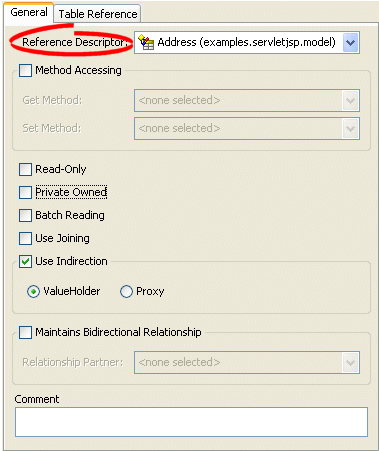|
Oracle TopLink Developer's Guide
10g Release 3 (10.1.3) B13593-01 |
|
 Previous |
 Next |
|
Oracle TopLink Developer's Guide
10g Release 3 (10.1.3) B13593-01 |
|
 Previous |
 Next |
In EIS mappings that extend oracle.toplink.mappings.ForeignReferenceMapping or oracle.toplink.mappings.AggregateMapping class, attributes reference other TopLink descriptors–not the data source. You can select a descriptor in the current project, or a descriptor from some other project.
Table 57-3 summarizes which EIS mappings support this option.
Table 57-3 Mapping Support for Reference Descriptor
| Mapping | Using TopLink Workbench
|
Using Java |
|---|---|---|
|
|
|
|
|
EIS Composite Direct Collection Mapping |
|
|
|
|
|
|
|
|
|
|
|
|
|
|
|
EIS Composite Collection Mapping |
|
|
|
|
|
|
To specify a reference descriptor for an EIS mapping, use this procedure.
Select the mapped attribute in the Navigator. Its properties appear in the Editor.
Click the General tab. The General tab appears.
Figure 57-1 General Tab, Reference Descriptor Field

Use the Reference Descriptor field to select the descriptor referenced by this relationship mapping.
|
Note: For one-to-one and one-to-many EIS mappings, the reference descriptor must be a root descriptor. See "Configuring an EIS Descriptor as a Root or Composite Type". |
You can specify a reference descriptor that is not in the current TopLink Workbench project. For example, to create a mapping to an Employee class that does not exist in the current project, do the following:
Add the Employee class to your current project. See "Working With Projects".
Create the relationship mapping to the Employee descriptor.
Deactivate the Employee descriptor. See "Active and Inactive Descriptors".
When you generate the deployment XML for your project, the mapping to the Employee class will be included, but not the Employee class itself.